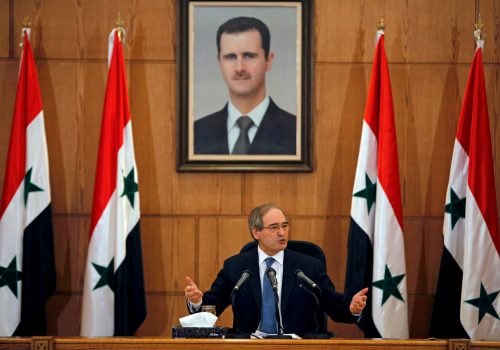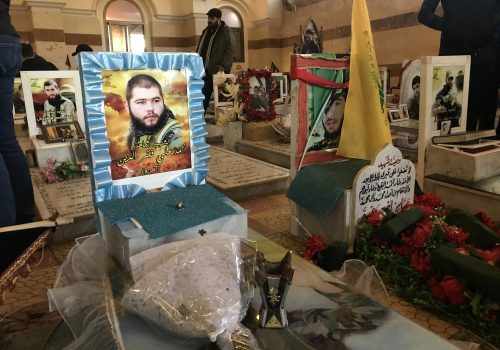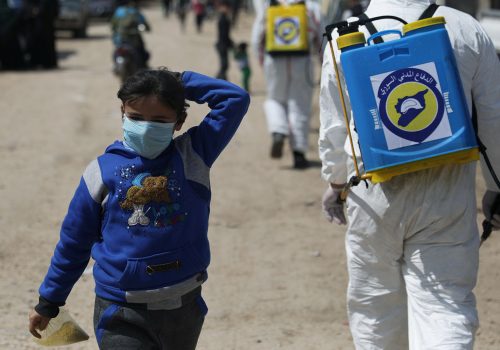This organization is working with armed groups to protect Syrian civilians. Here’s how they do it.
Over the last decade since the civil war began, Syrians have been suffering from countless human rights violations caused by the involved parties, including indiscriminate killings, arrests, enforced disappearances, displacements, and suppression of civil liberties. Adding fuel to the fire is the multiplicity of state and non-state actors exacerbating the conflict.
This past March, which marked the tenth anniversary of the uprising in Syria, the Syrian Network for Human Rights documented 227,413 civilian deaths and thirteen million displaced civilians since the conflict began.
While international efforts have not succeeded in ending the civil war, the humanitarian organization, Geneva Call—an independent humanitarian organization working in northwestern Syria to protect civilians in armed conflict—aims to reduce violations committed by armed non-state actors (ANSAs) against civilians. Geneva Call does this by providing training and workshops on international humanitarian law for ANSAs to comply with the rules of war.
Geneva Call’s deeds: How it works and why it interests the armed groups?
ANSAs are generally more willing to communicate with international organizations, such as Geneva Call, that design tailored approaches to ANSAs based on their ideology, background, and interests while informing ANSAs of international humanitarian standards. ANSAs often consider this an opportunity to interact with a credible international organization and bring their actions in compliance with international norms.
Geneva Call encourages interested ANSAs to sign a Deed of Commitment (DOC) “to respect the highest international standards to protect children in conflict,” particularly “the prohibition of the recruitment of children under [the age of eighteen] and the obligation to facilitate medical care and education to children.” Geneva Call also signed a DOC to ban sexual violence against civilians and fighters. The organization engages with more than fifteen ANSAs in Syria—of those, nine have signed DOCs with Geneva Call in the past few years. Geneva Call continues its active engagement with most armed groups individually and through their political or military umbrellas. The humanitarian organization works on tailored training sessions linking international humanitarian law and Sharia law—a method that is particularly effective given societal norms and customs. “Signing the DOCs between ANSAs and Geneva Call is a process done carefully. We must ensure [that] the monitoring process [is] able to measure and monitor the signatory ANSAs behavior, which is done through field visits, monitoring media, accessing internal regulations and files,” said Khalil Albarry, the country director for Syria at Geneva Call.
In an interview I had with Albarry, he claims that Geneva Call has been working in northeast and northwest Syria since the beginning of the conflict, providing training to Jaysh al-Islam in Idlib governorate and the western countryside of Aleppo, as well as many ANSAs like Harakat Hazim, Harakat Tahrir Watan, Al-Mutasim, Al-Hamzah, Central Division, and Division 23. Currently, Geneva Call is initiating dialogue with Hay’at Tahrir al-Sham, formerly known as Jabhat al-Nusra (an al-Qaeda affiliate), in Idlib governorate through the Syrian Salvation Government—a de facto alternative government of the Syrian opposition in Idlib, which ensures access to the area and protection of civilians in areas under the group’s control.
With the arrival of new management to the Syria mission in late 2020, Geneva Call started expanding operations and access in line with the growing role of these groups in Syria, stretching its work in the northeast beyond Al-Hasakah governorate to reach areas in Deir Ez-Zor, Raqqa, and Manbij, as well as northwest Syria. In addition to coordinating with its local non-governmental organization partners, Geneva Call engages with civil society organizations and local civil governance bodies. The organization also collaborates with the United Nations (UN) humanitarian leadership working on Syria. Furthermore, Geneva Call recently started discussions with the UN Children’s Emergency Fund, International Organization for Migration, and the UN Office for Coordination of Humanitarian Affairs on how to ensure humanitarian access and the protection of women and children in the active conflict through engagement with ANSAs and local civil authorities, noting that the UN does not have direct access to northern Syria.
According to Albarry, monitoring ANSAs’ compliance after signing the DOCs “is one of the complicated issues the organization faces. Compliance is monitored through the Department of Monitoring, Evaluation, Performance Follow-up, and Data Analysis.” Geneva Call regularly communicates reports with ANSA leadership and encourages groups to take appropriate actions to tackle any violations. If an ANSA doesn’t address grave violations and all other options are exhausted for addressing them, Geneva Call may consider a suspension of dialogue and resort to publicly reporting said violations.
Inclusion, equality, and active participation
In most areas where Geneva Call operates in Syria, women’s freedoms, such as the right to work, are restricted. However, the organization is trying to increase the number of female staff on its team.
For example, Geneva Call had a project with one of the partner organizations. While implementing the project, staff in Syria was about 70 percent female and 30 percent male.
“Despite the Geneva Call mandate [requiring] dealing with ANSAs and [delivering] trainings to male ANSA members most of the time, we now have key female trainers leading our intervention with key ANSAs in Syria,” explained Albarry. “And in our new programs in 2021-2022 we are considering working in partnership with key female-headed civil society organizations to ensure inclusion, equality, and active participation of key civil society organizations.”
Why Geneva Call matters
Military solutions are ineffective and impermanent. However, working with these armed groups is integral to reducing harm to civilians. If these factions are invited to the negotiation table to discuss humanitarian issues, many will be interested in this call. It is, therefore, possible to attract these armed groups and encourage better behavior as principal players in the current Syrian situation. The ANSAs are authorities in their areas of influence. Regardless of whether they are legal, including them in dialogue and introducing them to international humanitarian law standards might create a sense of responsibility and encourage them to improve their practices.
Geneva Call can be a very effective tool of de-escalation in Syria, given that the organization works with ANSAs on long-term programs, invites them to sign legal deeds to protect civilians, and tries to build a sense of trust with these groups. Awareness and training of ANSAs on humanitarian principles, human rights, and international law may contribute to restoring stability, transitional justice, and recovery—all of which are in the interest of civilians.
It must be noted that dialogue and training do not legitimize or give any credibility to the political classifications of these factions. Such engagements are necessary humanitarian actions to protect civilians in armed conflict.
Francois Zankih is a human rights defender and gender activist. He is also a member of the Syrian Women’s Political Movement and Amnesty International.
Image: Geneva Call working with armed group in Syria


